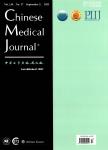Lipopolysaccharide induced activin A-follistatin imbalance affects cardiac fibrosis
Lipopolysaccharide induced activin A-follistatin imbalance affects cardiac fibrosis作者机构:Department of Cardiology Second Hospital Jilin UniversityChangchun Jilin 130041 China Department of Cardiology China-Japan Union Hospital JilinUniversity Changchun Jilin 130033 China
出 版 物:《Chinese Medical Journal》 (中华医学杂志(英文版))
年 卷 期:2012年第125卷第12期
页 面:2205-2212页
核心收录:
学科分类:1002[医学-临床医学] 100201[医学-内科学(含:心血管病、血液病、呼吸系病、消化系病、内分泌与代谢病、肾病、风湿病、传染病)] 10[医学]
主 题:cardiac remodeling activin A follistatin cardiac fibroblasts lipopolysaccharide
摘 要:Background Inflammation plays a pivotal role in cardiac remodeling, especially in myocardial fibrosis. Abnormal growth of cardiac fibroblasts is critically involved in the pathophysiology of cardiac hypertrophy/remodeling. Previous study has demonstrated that many inflammation stimulating factors trigger transforming growth factor-β (TGF-β) induction and reactive myocardial fibrosis. Activin A (ACT A) is a member of TGF-β superfamily, and follistatin (FS) is an activin-binding protein, i.e. an antagonist of ACT A. Our previous studies have shown that ACT A-FS imbalance occurs in rats with heart failure (HF), and overexpression of ACT A can lead to ventricular remodeling, and resultant HF. Low expression of FS after myocardial infarction further exacerbated HF. The pathogenic change resulting from overexpression of ACT A is consistent with that of overexpression of angiotensin II (Angll). Ventricular remodeling includes cardiocyte remodeling and myocardial interstitial collagen deposition and fibrosis, Therefore, the present study was designed to investigate the effects of inflammatory factors on the ACT A-FS and the secretions of cardiac fibroblasts in order to explore in depth the mechanism of myocardial fibrosis. Methods A rat model with HF was established, and the results showed that there was a greater degree of cardiac fibrosis in HF rats. In addition, we found that there was an imbalance of the ACT A/FS system in HF rats, which was characterized by increased levels of ACT A. Further, primary rat cardiac fibroblasts were cultured and the MTT assay was performed to determine the effect of the inflammatory factor-bacterial endotoxin lipopolysaccharide (LPS) on cardiac fibroblast proliferation. Results The results showed that LPS can stimulate the cardiac fibroblasts to proliferate in a dose-dependent manner. Cellular immunohistochemical staining showed that the rat cardiac fibroblasts themselves could express ACT A and FS proteins, and stimulation by LPS could ap



